#HISTORICAL FICTION
Text
can’t currently afford the print copy of the fabulous @lackadaisycats work?
maybe your local library will buy it in the meantime! hand for scale.
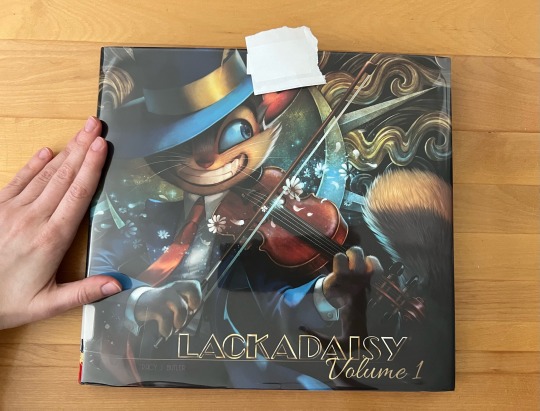
reading a hard copy of what I found years ago on the internet is cool in its own right, but the over 20 pages of bonus content are what’s really tempting.
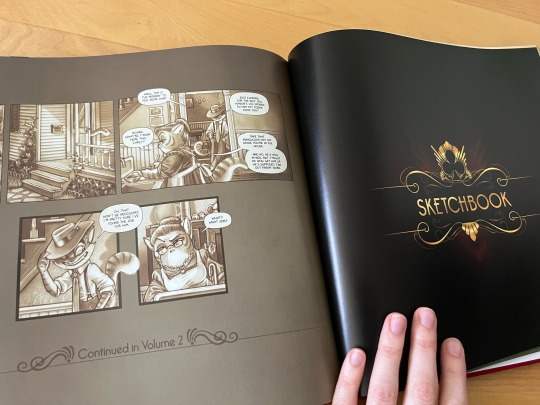
note about the back cover: this is what was facing out as I carried the book in my arm out of the library and into the streets. certainly didn’t make me look like a psycho I’m sure.

#cheers#lackadaisy#lackadaisy comic#lackadaisy cats#tracy j butler#iron circus comics#good art#good books#graphic novel#webcomic#public libraries#library books#library#books & libraries#support artists#1920s#historical fiction#anthromorphic#writeblr#artblr
405 notes
·
View notes
Note
I'm writing a story set in the 1800s that has an intellectually disabled character. how would you recommend I get across that they are intellectually disabled given that the respectful terms wouldn't really have existed then?
Hi!
I think that the best idea would be to just show the symptoms of their disability. Show them struggle with tasks (which ones would depend on the severity of their disability), if they are able to do so they could speak differently when compared to other characters - I often forget words when speaking, repeat myself because I didn't understand the answer to a question (or realized that it was the answer), or have to ask someone for a TLDR because I got lost in what they were saying (even if I'm actively paying attention). Sometimes I also have to circle multiple times to a single idea to "get it out" properly because it's hard to conceptualize it all at once. Your character could also get overwhelmed or stressed more easily.
Also, often ID comes with physical symptoms so they could have dyspraxia like me! In case their ID is caused by a syndrome, it could work to describe the facial features that come with it, e.g. I think most readers would be familiar with how a person with Down Syndrome looks like. But the most important part is to show the actual symptoms of the disability!
If you want to name the disability without using slurs, "delayed" or "mentally disabled" or "having a slower thought process" could also work. They wouldn't be my primary choices in most contexts, but for historical fiction it's a bit different. "Handicapped" also started being used in the late 19th century, it's not necessarily a slur but it's still offensive. You could go for something like "fallen behind their peers" if you want.
I think that it would be a good idea to mention in some kind of author's note that your work is a piece of historical fiction and that those terms aren't preferred now (and show those that are, i.e. intellectual disability in most places and general learning disability in the UK). A lot of people don't know this, so it could be genuinely educational!
Thanks for your ask, I hope this helps!
mod Sasza
39 notes
·
View notes
Text
If some men had a gift for seemly relations with space, and the ability to move gracefully through it, this was not one of them.
King Hereafter, Dorothy Dunnett
#king hereafter#dorothy dunnett#book quotes#ms. dunnett WHY are you like this (admiring)#historical fiction
34 notes
·
View notes
Note
Hi! I'm not sure if you are currently taking requests, so feel free to ignore mine if you aren't! If you are taking them, however, would you please write something for King Baldwin IV overhearing reader sing and falling further in love with her because of her soft and sweet voice? Upon realizing that he's there, she becomes extremely flustered and apologizes for disrupting his peace and quiet. Thank you!
King Baldwin IV x reader - Sweetest of melodies
A/N: omg it’s been so long since I’ve received a request! I can’t lie, Baldwin is my supreme comfort character, I think I’ll never stop writing fro him because it gives me sooo much joy😩😩😩 I personally like to think of this piece as taking place a few months after Baldwin’s and reader’s wedding, so it could be considered a sequel for my first fic ever. Also, the song mentioned in this piece is a real song from the 12th century called "Can vei la lauzeta" (in English,"When I see the lark") by Bernart de Ventadorn, and the painting is "Lovers in a garden" by Charles Edward Perugini!!
Oh btw!! I’m working on a long ass series about him, based off of a prompt by @phantomsghoulette which I absolutely LOVED. Sooo all the KoH fans stay tuned for future updates🤭
Warning: nothing really, just pure fluff. Maybe you could say that religious innuendos could be something triggering for some people but I don’t know. There might be ONE, SLIGHTLY spicy mention but only if you squint really really hard. Also, keep in mind that the historical accuracy in my fics is rather relative, I try to add some details here and there but I don’t have the knowledge (nor the skills) to write a piece 100% accurate to the real history. Also, reader’s gender is female and uses she/her pronouns!!
Word count: 2918
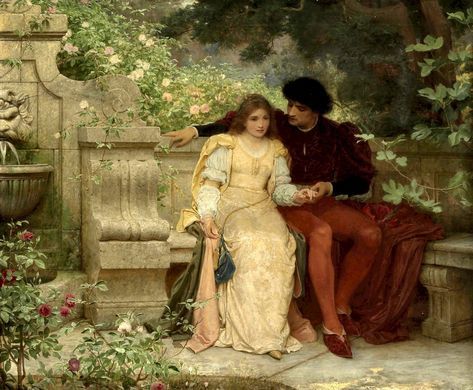
Someone would say Baldwin's patience could already be put to test by only his illness, which she ruthlessly does not grant him a moment's respite, the eternal enemy of his body and his spirit. But no, to this perpetual torment of his had to be added the perilous duties of a king. And it was certainly not governing his people and lands that sucked what little energy he had left; this duty of his, given by his father and willed by divine design, he had long since embraced.
It was the nobles, the leeches who had drained him of his lifeblood lately. It was their endless demands, the insidious words that hissed behind his back, the languid bows and sleazy gifts designed only to gain some favor from him. Looking around him, he seemed to see only vices and sinners, power-hungry beasts just waiting for his moment of weakness so they could feed on what Baldwin had under his power.
In fact, not without reason in the past the young monarch had attempted to abdicate the throne and leave it in the hands of one of his sisters, rid himself of this burden and devote the rest of his short life taking care of his declining health and to nurture his mind away from so much corruption. At times he dreamed of retiring to France, experiencing for the first time that cold climate and verdant landscape of which his preceptors and advisors told him so much.
In fact, not without reason in the past the young monarch had attempted to abdicate the throne and leave it in the hands of one of his sisters, rid himself of this burden and devote the rest of his short life taking care of his declining health and to nurture his mind away from so much corruption. At times he dreamed of retiring to France, to experience for the first time that cold climate and verdant landscape of which his preceptors and advisors told him so much.
And he dreamed of taking you with him, imagined how sweet his life would be if his only concerns were taking care of his health and you, faithful wife, sole blessing in his life battered by such burdens. How he would wish that his days would revolve around you, that his first thought in the morning would be riding by your side through the flourishing meadows, and his last thought in the evening would be caressing your face as you lie slumbering in his arms.
It would have been a blissful fate his, if only Sybilla's husband had not died at the very moment when he would have needed him most. If only his mother had not convinced him that Guido de Lusignan was a good fit for his sister and had continued to seek a new consort for her, perhaps that fate would not have been snatched from him so early. Too late to repent now, for Baldwin would have preferred to die agonizingly on his throne rather than leave power in the hands of that bumptious and arrogant lord, who was noble only in title.
And so he found himself in this sort of hellish limbo, forced into a position that should never be required of a man in his condition, but prevented by his morality from abandoning his reign, impelled by faith in God's greater plan, that his suffering should not be in vain.
And his faith always seemed to strengthen when he had a way to escape the stifling air that characterized the throne room, always packed with knights and crusaders and nobles, when he had a way to retreat to the palace gardens, one of the few verdant places in all of Jerusalem.
With slow, swaying steps, Baldwin strolled slowly among the local palm trees and flower beds from the faraway lands, those where men speak Italian and the more distant ones, those from which his fathers came. Exotic fruits mingled with those more congenial to the French, who out of nostalgia for their lands and fields did what they could to bring the seeds of these plants with them to overseas.
His mind seemed to go out, shifting his attention from the constant buzz of court demands and duties to the chirping of birds perched on the roof, to the eviction of the soft branches that shielded him from the scorching sun. He enjoyed the refreshing air that reigned in that small oasis of greens, which was able to infiltrate the fabric of his white robes, crossing the bandages that covered much of his body and finally reaching his skin, numbed by leprosy.
To tell the truth, of that refreshing sensation little reached his damaged nerves, if not for those few points that had been spared by the merciless disease, from which departed that unusual shiver that caused him a delicate smile of relief, enjoying the refreshing breeze. Then he closed his eyes and breathed in, discovering with satisfied surprise that that light gust was also a harbinger of an intoxicating perfume, a mixture of exotic and familiar.
How funny to think of the concept of "exotic", for an Angevin born and raised in the unknown lands of the east. For him it was exotic French fruit, exotic were the green plains and heavy clothing that brought his allies from the northwest, and equally alien to the snowy mountains and forest beasts that he saw drawn in detail in his childhood books. It was these changes of perspective that stimulated his mind in a myriad of thoughts and reflections, but in a pleasurable way for him, not as exhausting as his daily duties.
His reflections on exotic and local made his mind travel, wandering until he came to a subject very close to him: Muslims and Jews, reflecting well on the landscape in front of him, recognized that he could share with them the same concepts of what is foreign and what they can claim the original belonging. And he could not but reflect on how it must have been for the first inhabitants of Jerusalem to observe the Franks who came as conquerors, and filled their gardens with such foreign plants as those pale warriors who had taken possession of their dwelling... But after all, the French soldiers who were emissaries of God’s will needed something familiar to stabilize them as they fought to reclaim the Promised Land, ut Deus voluit.
But all his brooding over these matters of conquest and submission ended up in the background in his mind, when a colorful scarlet sphere caught his attention. An exquisitely red apple seemed to tempt him from a branch just above his head, beckoning him to be picked and savored by the king, that he might lose himself in the juicy sweetness of that fruit with origins so far removed from the Holy Land. But the king's modesty prevented him from yielding to that temptation, wanting to avoid exposing the advanced state of deterioration in which his mouth was.
And in fact if that temptation had been alive it would have pale in front of something much more captivating, a sound that echoed in the most melodious distance of the song of any nightingale. Baldwin was surprised to think that he had not realized before the melody that inibriated the atmosphere around him, so taken by the tribulations of his mind that he almost missed such an intoxicating song. He did not know what he felt once he arrived in Heaven, if he had ever arrived in spite of the unjust fate in Hell that the evil Saracens wished him. He didn’t know it, but if one ever had to imagine what Heaven sounded like, that song would come to mind.
When I see the lark beating
Its wings in joy against the rays of the sun
That it forgets itself and lets itself fall
Because of the sweetness that comes to its heart
She sang in Occitan, the beautiful one in the distance. The voice of his people, of his lineage, that few in the palace can pronounce after so many years of distance from their homeland in Provence. Paying more attention to the echoing song, he would not even have had to approach it to give a face to that melodic voice: he knew how to recognize his wife’s voice.
Yet it was a new context in which he saw you, new facets of you that he had not yet had a chance to observe. Your voice, sweet as honey, venerable like all your other traits, he had never heard it except in speech, when you were proclaiming orders before your subjects with the authority fit for a queen, or when you laughed at the poems and performances of the court singers, or when you whispered in Baldwin’s ears sweet words, while you lay with bodies merged between the soft silk sheets. Always spoken, but never sung.
Alas! Such great envy then overwhelms me
Of all those whom I see rejoicing,
But though he didn’t need to approach you to recognize you, the desire to see your face exceeded any of his other needs. As if mesmerized by the sound of a siren, Baldwin was advancing towards you, with steps so slow that it seemed a hunter about to catch a deer in the woods. He wanted nothing more than to hear you sing again, that you continue to bless him with that angelic melody. What worse sin would there be than to interrupt your song, more sacred than a prayer?
His stomach filled with butterflies and turned upside down like the beasts' jugglers, his breath seemed to stop in his throat, depriving him of the breath he no longer needed, as long as he could hear you sing a moment more. And her cheeks warmed, when finally she saw you among the white lilies, more beautiful than divine salvation.
I wonder that my heart, at that moment,
Does not melt from desire.
Baldwin wondered if you sang with him in mind, if those words of love reflected your own emotional turmoil.
Oh, if only it were so, and your singing equalled his own words inscribed in the sonnets and poems he composed in your honor, which he himself commissioned from your favorite singers to perform at banquets, only to steal an embarrassed smile and to see the blush of your cheeks, along with the glint in your eyes.
Whether it was or not, the outcome remained the same since he was at that moment in your proximity, in the same state mixed with adoration, love and wonder at the bold gesture. But if only he had confirmation from your words...
Alas! How much I thought I knew
About love, and how little I know,
Because I cannot keep myself from loving
The one from whom I will gain nothing.
"My angel, your voice sounds like heaven but your words are false." Baldwin practically saw you blow up from your session, completely taken aback by his sudden appearance, unaware that your husband has been acting as a secret public all this time. Your initial surprise quickly turns into a laugh to mask your embarrassment for being caught in a moment like this, when you thought you were alone to be able to run the streets of music with your voice.
"I beg your pardon, I thought I was alone in the gardens," your eyes met his own only for a moment, before you turned your face to try and hide the blush of your face, "it was just a silly song I heard singing to the Provençal knights. I hope I did not disrupt your walk, my love..”
He laughed softly, trying to hide his amusement from having caught you off guard. He approached you more quickly than when he did just a few moments before, but with the same phlegm that managed to inspire a feeling of safeness in you. Sitting by your side on the bare rock, he raised his bandaged hand to gently cup your face and make you turn your eyes towards him. It was only then, when you had no choice but to look at Baldwin in the face that you noticed how his eyes, the only part of his face exposed to the outside world, formed two half-moons, and you came to find that it was because of how widely he was smiling, as you lowered the veil from his face.
He was making fun of you, you realized. With that swagger in his manner, you understood that his amusement came from your embarrassment at that silly misunderstanding. Laughing softly, he gently shook his head before bringing both hands to your face, holding it as if it were the most sacred of relics. "As much as I would love to hear you sing of your affection for me, just to hear your voice echoing in the air is the sweetest of gifts. How could you deprive me of this blessing thus far, my dear?"
You could do nothing but giggle at his sweet words, bringing your hands to his wrists to feel him closer to you. "You flatter me, my king. My voice boasts nothing more than those sweet melodies that the singers in the palace sing. Mine is only a dabble."
His gaze softened, his playful spirit addicted to your presence. He took the floor again, in a tone as soft as cotton, "At least this once, my queen, allow me to disagree with your words. My life may be short and my reality small, but never have I heard such an angelic voice, singing such sweet melodies. And God may not yet have granted me the ability to predict the future, but in my heart I know well that never will any singer be able to hold a candle to your beautiful voice, never will any song be able to express the same feeling of ecstasy.
"You, my angel, have managed to make a simple ballad an absolute work of art through your voice. I think I should take you with me into battle next time, for with your mere voice you could addict Saladin and his entire army.
"And seeing you here, angelic and perfect like the lilies that surround you, singing so softly that it would make any bird jealous, that I realize that whatever toil, whatever challenges God has stored up for me, and all those that still await me in my life, are worth it, if at the end of each of them there is you, voice of an angel, to hold a place for me in your arms of heaven."
You were sure you were on the verge of crying a flood of tears, the result of pure emotion at his sweet words. It was not new to you that Baldwin worshipped you as much as the God to whom his kingdom was consecrated, from the first moment he got to hear your voice and admire your face, and you knew at once that he had become yours, body and soul. But it was new to you to see him like that, completely entranced by your simple being-it was something new. A wonderful newness that made you feel like the most desired of women on this earth.
Taken by a rush of boldness, you practically jumped into his arms, wrapping your arms around his neck; you ended up on top of him, with his hands around your hips. You both laughed, like two little boys frolicking in the gardens. And you left a kiss on his left cheek, then on the bridge of his nose. A kiss again on his forehead, and then down on the side of his lips. When you were about to give him another kiss, just where he most yearned for your lips, against his, you stopped a few inches away, with a wide smile, before speaking again, "If so little is enough to make your happiness, then I will sing to you every day, whenever you ask. Let me be your nightingale, your morning song and your lullaby all at once!"
"I couldn't wish for anything else, my dear. Now, however, I beg you, sing one more melody for me, before my duties drag me back to the palace, and I shall consider myself a blessed man."
"With great pleasure, my love." Your voice was now little more than a whisper. With a languid movement, Baldwin moved his body to rest his head on your lap, and you eagerly greeted him. After slightly moving the hood that veiled his head, so that you could play with his golden locks, you began to sing a new melody, one that this time spoke of reciprocated love, of the joy of being able to hold your loved one in your arms. But the words you sang barely reached Baldwin before his sky-colored eyes closed softly, his mind giving him at least a moment's despite from his perilous life. You continued to sing, caressing his face, which from day to day appeared more and more mutilated by his disease, singing the sweetest of melodies so as to prolong this idyll in which you and your husband found yourselves in.
For with you Baldwin had a way of putting the crown aside, and being nothing more than a foolish young man in love, whose only duty was to love you, to love you with all the love that an angel like you deserved.
@sweetworkoffiction hope you like it <3
#fluff#writers on tumblr#f!reader#kingdom of heaven#king baldwin iv#king baldwin x reader#king baldwin x you#koh#medieval fiction#historical fiction#writing requests#requests open#anon ask#anon request
31 notes
·
View notes
Text
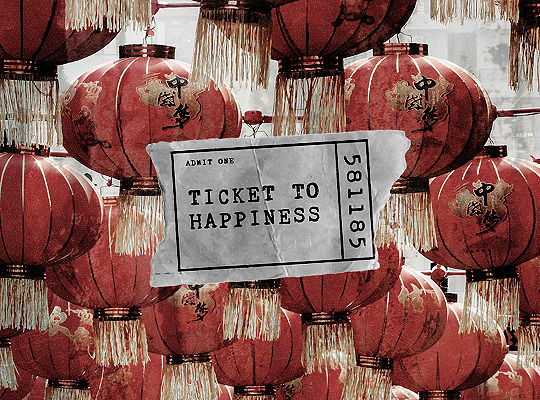
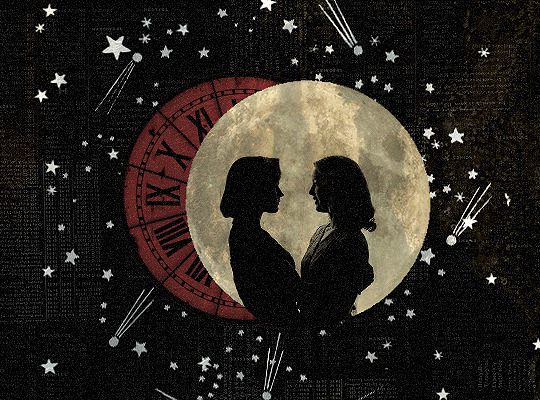
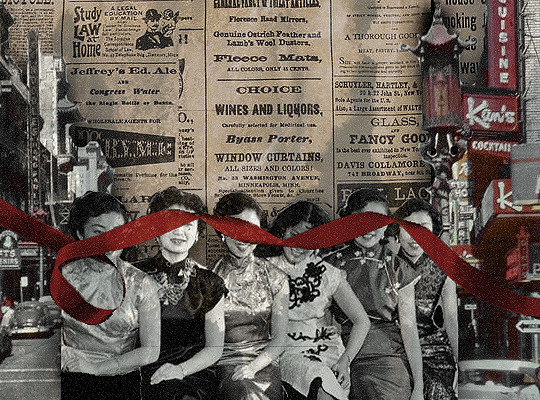
A few hours at home and the Telegraph Club seemed more like a fantasy than a real thing. This troubled her. It felt as if someone had taken an eraser to her memory - to her very self - and rubbed at it, then blown away the remains.
Last Night at the Telegraph Club by Malinda Lo
#bookedit#litedit#yalitedit#sapphic books#last night at the telegraph club#malinda lo#historical fiction#ya fiction#queer fiction#lesbian fiction#booklr#*#*graphic
23 notes
·
View notes
Text
One of my biggest nitpicks in fiction concerns the feeding of babies. Mothers dying during/shortly after childbirth or the baby being separated form the mother shortly after birth is pretty common in fiction. It is/was also common enough in real life, which is why I think a lot of writers/readers don't think too hard about this. however. Historically, the only reason the vast majority of babies survived being separated from their mother was because there was at least one other woman around to breastfeed them. Before modern formula, yes, people did use other substitutes, but they were rarely, if ever, nutritionally sufficient.
Newborns can't eat adult food. They can't really survive on animal milk. If your story takes place in a world before/without formula, a baby separated from its mother is going to either be nursed by someone else, or starve.
It doesn't have to be a huge plot point, but idk at least don't explicitly describe the situation as excluding the possibility of a wetnurse. "The father or the great grandmother or the neighbor man or the older sibling took and raised the baby completely alone in a cave for a year." Nope. That baby is dead I'm sorry. "The baby was kidnapped shortly after birth by a wizard and hidden away in a secret tower" um quick question was the wizard lactating? "The mother refused to see or touch her child after birth so the baby was left to the care of the ailing grandfather" the grandfather who made the necessary arrangements with women in the neighborhood, right? right? OR THAT GREAT OFFENDER "A newborn baby was left on the doorstep and they brought it in and took care of it no issues" What Are You Going to Feed That Baby. Hello?
Like. It's not impossible, but arrangements are going to have to be made. There are some logistics.
#idk what to tag this#worldbuilding#writing fiction#historical fiction#fantasy#a real-life example: my dad (a pediatrician) was once entrusted with the care of a baby who was born with a rare condition#this was in a place without great hospital/medical access and anyway they were going to fly the baby over#and he specifically asked them to bring the mother and baby#they show up with baby and...the baby's uncle#and he was like. y'all. do you think I asked for the mom to come just for fun??? We don't have formula here. what is the baby going to eat?
37K notes
·
View notes
Text
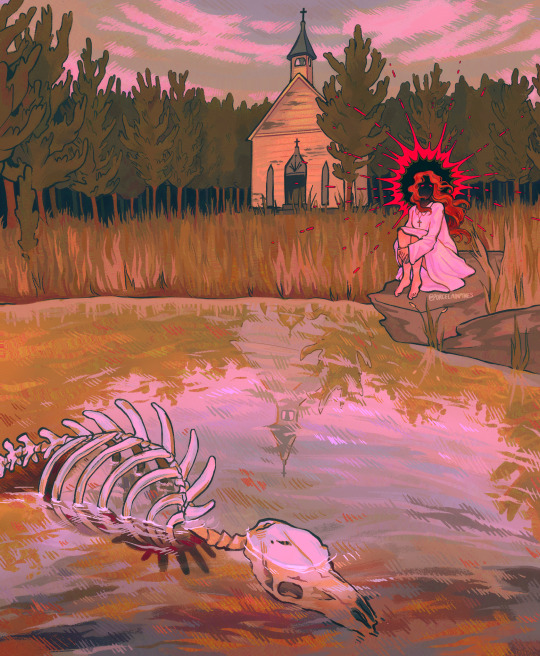
putrid air
#reference photo/inspo is by brendan burton (@burtoo on twt)#original character#digital painting#oc artist#queer artist#digital art#trans artist#lgbt art#oc#oc artwork#cowboy oc#historical oc#western oc#historical fiction#character design#cowboys#rosie#horror art#creepy art#unsettling art
42K notes
·
View notes
Text
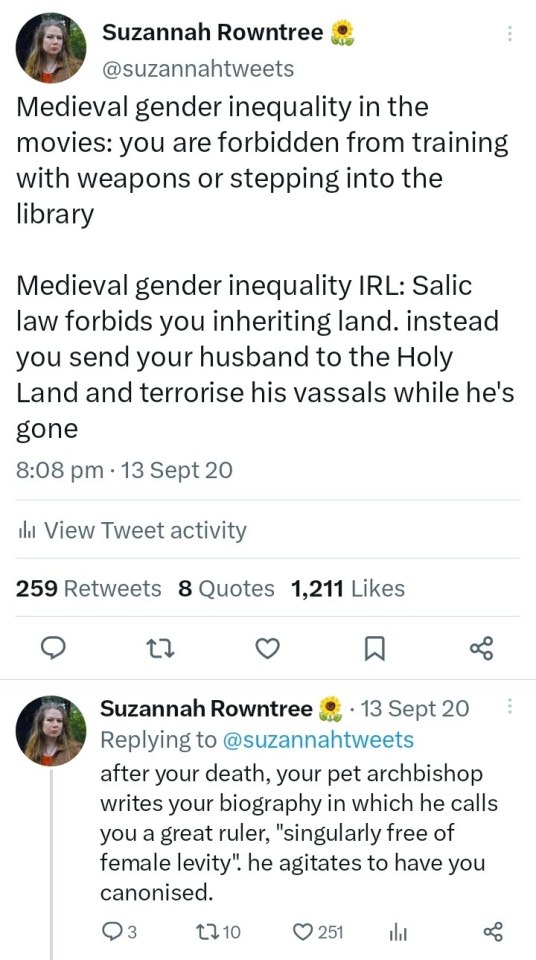
all RIGHT:
Why You're Writing Medieval (and Medieval-Coded) Women Wrong: A RANT
(Or, For the Love of God, People, Stop Pretending Victorian Style Gender Roles Applied to All of History)
This is a problem I see alllll over the place - I'll be reading a medieval-coded book and the women will be told they aren't allowed to fight or learn or work, that they are only supposed to get married, keep house and have babies, &c &c.
If I point this out ppl will be like "yes but there was misogyny back then! women were treated terribly!" and OK. Stop right there.
By & large, what we as a culture think of as misogyny & patriarchy is the expression prevalent in Victorian times - not medieval. (And NO, this is not me blaming Victorians for their theme park version of "medieval history". This is me blaming 21st century people for being ignorant & refusing to do their homework).
Yes, there was misogyny in medieval times, but 1) in many ways it was actually markedly less severe than Victorian misogyny, tyvm - and 2) it was of a quite different type. (Disclaimer: I am speaking specifically of Frankish, Western European medieval women rather than those in other parts of the world. This applies to a lesser extent in Byzantium and I am still learning about women in the medieval Islamic world.)
So, here are the 2 vital things to remember about women when writing medieval or medieval-coded societies
FIRST. Where in Victorian times the primary axes of prejudice were gender and race - so that a male labourer had more rights than a female of the higher classes, and a middle class white man would be treated with more respect than an African or Indian dignitary - In medieval times, the primary axis of prejudice was, overwhelmingly, class. Thus, Frankish crusader knights arguably felt more solidarity with their Muslim opponents of knightly status, than they did their own peasants. Faith and age were also medieval axes of prejudice - children and young people were exploited ruthlessly, sent into war or marriage at 15 (boys) or 12 (girls). Gender was less important.
What this meant was that a medieval woman could expect - indeed demand - to be treated more or less the same way the men of her class were. Where no ancient legal obstacle existed, such as Salic law, a king's daughter could and did expect to rule, even after marriage.
Women of the knightly class could & did arm & fight - something that required a MASSIVE outlay of money, which was obviously at their discretion & disposal. See: Sichelgaita, Isabel de Conches, the unnamed women fighting in armour as knights during the Third Crusade, as recorded by Muslim chroniclers.
Tolkien's Eowyn is a great example of this medieval attitude to class trumping race: complaining that she's being told not to fight, she stresses her class: "I am of the house of Eorl & not a serving woman". She claims her rights, not as a woman, but as a member of the warrior class and the ruling family. Similarly in Renaissance Venice a doge protested the practice which saw 80% of noble women locked into convents for life: if these had been men they would have been "born to command & govern the world". Their class ought to have exempted them from discrimination on the basis of sex.
So, tip #1 for writing medieval women: remember that their class always outweighed their gender. They might be subordinate to the men within their own class, but not to those below.
SECOND. Whereas Victorians saw women's highest calling as marriage & children - the "angel in the house" ennobling & improving their men on a spiritual but rarely practical level - Medievals by contrast prized virginity/celibacy above marriage, seeing it as a way for women to transcend their sex. Often as nuns, saints, mystics; sometimes as warriors, queens, & ladies; always as businesswomen & merchants, women could & did forge their own paths in life
When Elizabeth I claimed to have "the heart & stomach of a king" & adopted the persona of the virgin queen, this was the norm she appealed to. Women could do things; they just had to prove they were Not Like Other Girls. By Elizabeth's time things were already changing: it was the Reformation that switched the ideal to marriage, & the Enlightenment that divorced femininity from reason, aggression & public life.
For more on this topic, read Katherine Hager's article "Endowed With Manly Courage: Medieval Perceptions of Women in Combat" on women who transcended gender to occupy a liminal space as warrior/virgin/saint.
So, tip #2: remember that for medieval women, wife and mother wasn't the ideal, virgin saint was the ideal. By proving yourself "not like other girls" you could gain significant autonomy & freedom.
Finally a bonus tip: if writing about medieval women, be sure to read writing on women's issues from the time so as to understand the terms in which these women spoke about & defended their ambitions. Start with Christine de Pisan.
I learned all this doing the reading for WATCHERS OF OUTREMER, my series of historical fantasy novels set in the medieval crusader states, which were dominated by strong medieval women! Book 5, THE HOUSE OF MOURNING (forthcoming 2023) will focus, to a greater extent than any other novel I've ever yet read or written, on the experience of women during the crusades - as warriors, captives, and political leaders. I can't wait to share it with you all!
#watchers of outremer#medieval history#the lady of kingdoms#the house of mourning#writing#writing fantasy#female characters#medieval women#eowyn#the lord of the rings#lotr#history#historical fiction#fantasy#writing tip#writing advice
29K notes
·
View notes
Text
why are skirts inherently evil and oppressive in historical fiction until men are wearing them
I've never heard anyone going on at length about how Universally ImpracticalTM the garb of a Scotsman or an ancient Roman politician are
suddenly everyone has a concept of situational practicality that previously was not there
#history#clothing history#historical fiction#'SKIRTS are so IMPRACTICAL-' always? every time? for everyone?#because I don't know about you but I live in a city and work in museums#skirts are A-okay for me#also people have done MANY types of physical activity in skirts for centuries. sometimes pants are more practical for sure!#but. not always.#and you never hear fiction authors talking about how oppressed Scotsmen are by their kilts#'he couldn't FUNCTION because he wasn't wearing PANTS!' I'd like to see someone try it
2K notes
·
View notes
Note
Hi I was wondering if you know of any good resources to get good vintage names that aren’t typical and boring (Fred, Edward, Alfred etc)?
Some of the names in the Santa letters are certainly peculiar and it made me wonder what kind of names those “vintage baby names” lists are leaving out 😜
Thanks! And happy new year 🎊
One place to get a good general overview of what names were like in a certain era is the Social Security Administration's lists of popular names that go back to the 1880s. The further down the lists you go the less common they get. However these are still all names that had at least a few hundred occurrences, so you're not going to have any Gloyds etc..
I personally always try to find names from primary sources (newspapers, census, vital records, etc.) as you're more likely to come across unusual names that don't make the top 200 lists.
Also keep in mind that name popularity varied greatly by location. Just because there were a bunch of Juanitas in Tulsa in 1930 doesn't mean there were that many in Boston.
Honestly if anyone is working on a specific project and needs names from a certain location/era (i.e. you're writing a novel that takes place in London in 1627) feel free to message me and I'd be happy to work with you to compile a list from primary sources. I love this stuff and will use any valid excuse to spend an evening digging through 17th century baptismal records.
#if you buy me a coffee I might even make you a simple custom name generator#I do this for myself all the time because I'm a party person who really likes spreadsheets#names#history#historical fiction#writing resources#asks#@sir-sleepalot#writing reference#character names
2K notes
·
View notes
Text
my blacksmith business is doing unusually well this month
keep reading >>
1K notes
·
View notes
Text
Non-offensive Historical terms for Black people in historical fiction
@pleasespellchimerical asked:
So writing historical fiction, with a white POV character. I'm not sure how to address race in the narration. I do have a Black main character, and I feel like it'd feel out of place to have the narrator refer to her as 'Black', that being a more modern term. Not sure how to do this without dipping into common historical terms that are considered racist today. Thoughts on how to handle this delicately, not pull readers out of the narrative? (fwiw, the POV character has a lot of respect for the Black character. The narration should show this)
There are non-offensive terms you can use, even in historical fiction. We can absolutely refer to Black people without slurs, and if slurs is all one can come up with, it’s time to go back to the drawing board. I cannot say which terms are best for your piece without knowing the time period, but hopefully the list below helps.
Historical terms to use for Black people (non-offensive)
African American documented as early as 1782 (documented in an ad in the Pennsylvania Journal). Note the identity isn’t accurate for non-American Black people.
African could refer to African people or “from 1722 as ‘of or pertaining to black Americans.’”
The place of origin could also be used. For example, “a Nigerian woman”
Africo-American documented as early as 1788.
People of Color documented as early as 1796 (with specific contexts, usually mixed people)
Afro American documented as early as 1817, 1831 (depending on source)
Black American documented as early as 1831
Black was used in Old English to refer to dark-skinned people. Black was not capitalized until recent years, so “She was a young black woman.” would make sense to say, though “She was a young Black woman.” is the better standard today, although not universally adopted. I personally prefer it capitalized.
Moor was used as early as the late 1400s for North African people, but had a somewhat flexible use where anyone visibly Black / Of African descent or the Afro Diaspora might be referred to or assumed as a Moor. Note, it has other meanings too, such as referring to Muslim people, but that doesn’t mean the person using it is going by the dictionary definition. Not really the way to go today, but okay in a historical setting (in my opinion).
Biracial (1860s), mixed race (1872), multiracial (1903) and multicultural (1940s) are also terms to refer to people of two or more races.
Occupation + description. Throughout history, many people have been referred to as their occupation. For example, the Carpenter, The Baker, the Blacksmith. Here’s an example of how you might go about using occupation and traits to identify a Black character in history. Here’s an example I came up with on the fly.
“You should go by Jerry’s. He’s the best blacksmith this town’s ever seen. Ya know, the real tall, dark-skinned, curly haired fellow. Family’s come here from Liberia.”
Offensive and less-sensitive terms for Black people
Blacks was used in plural more, but this is generally offensive today (Even writing it gives me **Thee ick*)
Colored was mostly used post-civil war until the mid 20th century, when it became unacceptable. This is not to be conflated with the South African Coloured ethnic group.
Negro/Negroes were also used as early as the 1550s. Capitalization became common in the early 20th century. I'm sure you know it is offensive today, though, admittedly, was not generally seen as such until around the 1960s, when Black replaced it. It does have its contexts, such as the trope “The Magical Negro” but going around using the term or calling someone that today is a lot different.
Mulatto referred to mixed people, generally Black and white, and is offensive today.
The N-word, in all its forms, is explicitly a slur, and there is absolutely no need to use it, especially in a casual manner, in your story. We’ve written about handling the N-word and alluding to it “if need be” but there are other ways to show racism and tension without dropping the word willy-nilly.
Deciding what to use, a modern perspective
I’m in favor of authors relying on the less offensive, more acceptable terms. Particularly, authors outside of the race. Seldom use the offensive terms except from actual direct quotes.
You do not have to use those offensive terms or could at least avoid using them in excess. I know quite famous stories do, but that doesn’t mean we have to so eagerly go that route today. Honestly, from teachers to school, and fellow non-Black students, it’s the modern day glee that people seem to get when they “get a chance to say it” that makes it worse and also makes me not want to give people the chance.
It goes back to historical accuracy only counting the most for an “authentic experience” when it means being able to use offensive terms or exclude BIPOC from stories. We’ve got to ask ourselves why we want to plaster certain words everywhere for the sake of accuracy when there are other just as accurate, acceptable words to use that hurt less people.
Disclaimer: Opinions may vary on these matters. But just because someone from the group cosigns something by stating they’re not offended by it, doesn’t mean a whole lot of others are okay with it and their perspectives are now invalid! Also, of course, how one handles the use of these words as a Black person has a different connotation and freedom on how they use them.
~Mod Colette
The colonial context
Since no country was mentioned, I’m going to add a bit about the vocabulary surrounding Black people during slavery, especially in the Caribbean. Although, Colette adds, if your Black characters are slaves, this begs the question why we always gotta be slaves.
At the time, there were words used to describe people based on the percentage of Black blood they had. Those are words you may find during your searches but I advise you not to use them. As you will realize if you dive a bit into this system, it looks like a classifying table. At the time, people were trying to lighten their descent and those words were used for some as a sort of rank. Louisiana being French for a time, those expressions were also seen there until the end of the 19th century.
The fractions I use were the number of Black ancestors someone had to have to be called accordingly.
Short-list here :
½ : mûlatre or mulatto
¼ or ⅛ : quarteron or métis (depending on the island, I’m thinking about Saint-Domingue, Martinique and Guadeloupe)
1/16 : mamelouk
¾ : griffe or capre
⅞ : sacatra
In Saint-Domingue, it could go down to 1/64, where people were considered sang-mêlé (mixed blood for literal translation, but “HP and the Half-Blood Prince” is translated “HP et le Prince de Sang-Mêlé” in French, so I guess this is another translation possibility).
-Lydie
Use the 3rd person narrative to your advantage
If you are intent on illustrating historical changes in terminology consider something as simple as showing the contrast between using “black” for first person character narration, but “Black” for 3rd person narrator omniscient.
-Marika
Add a disclaimer
I liked how this was addressed in the new American Girl books
it’s set in Harlem in the 1920’s and there’s a paragraph at the beginning that says “this book uses the common language of the time period and it’s not appropriate to use now”
-SK
More reading:
NYT: Use of ‘African-American’ Dates to Nation’s Early Days
The Etymology dictionary - great resource for historical fiction
Wikipedia: Person of Color
2K notes
·
View notes
Text

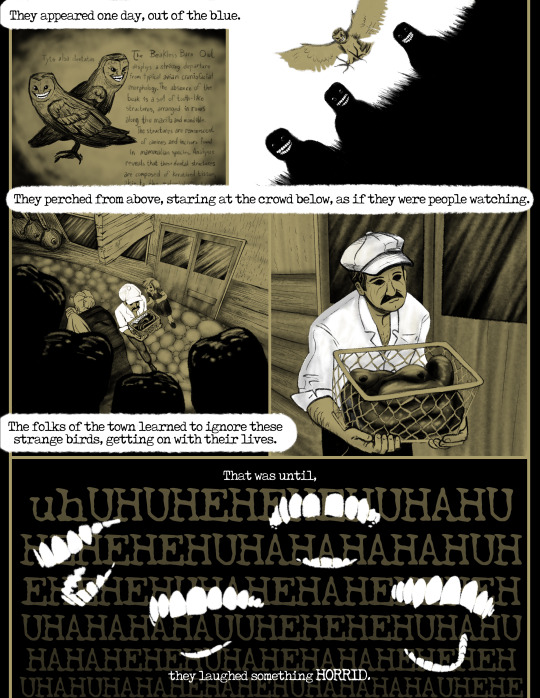
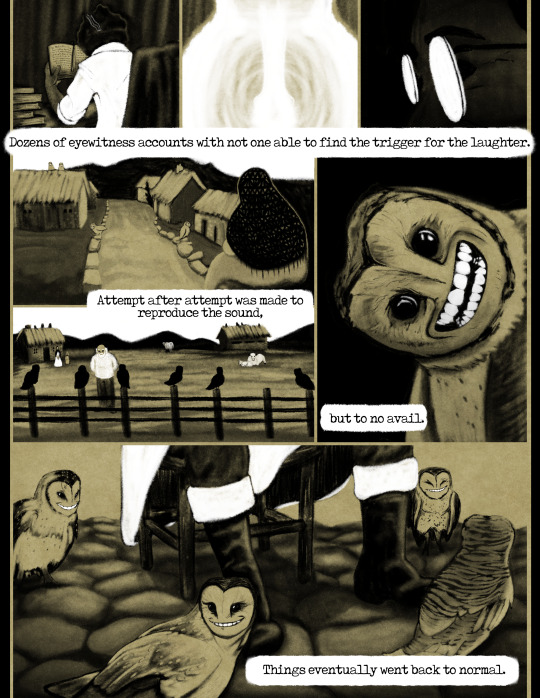
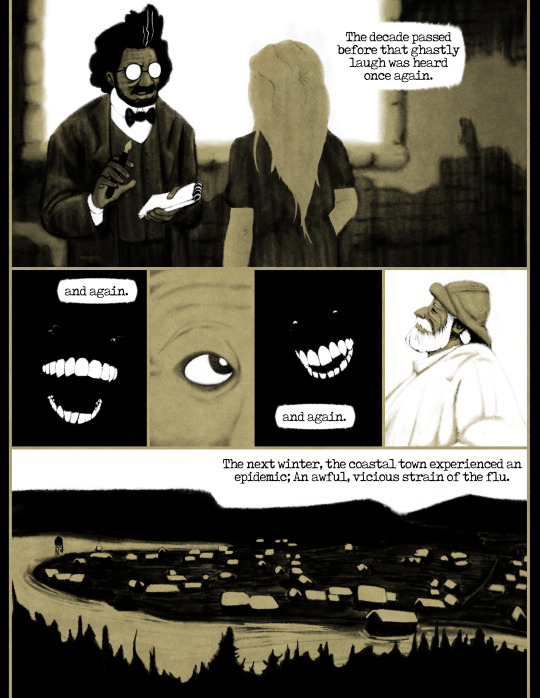
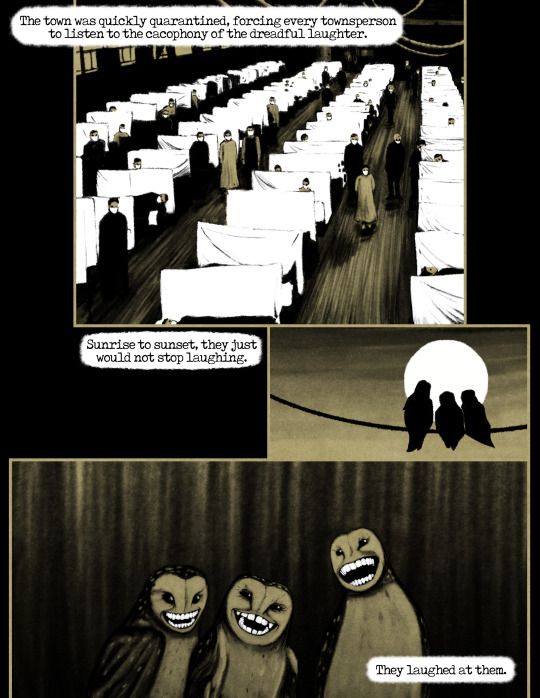
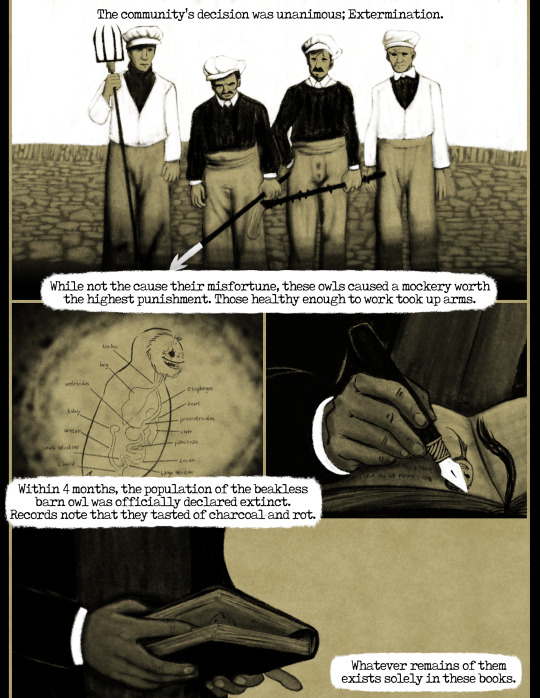

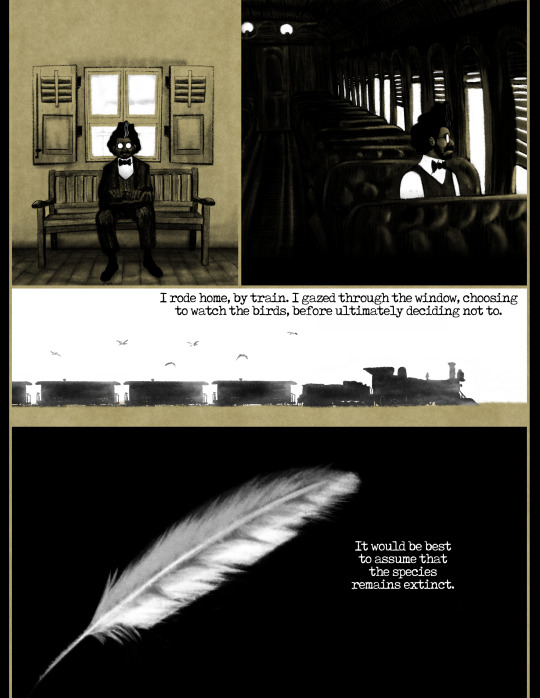
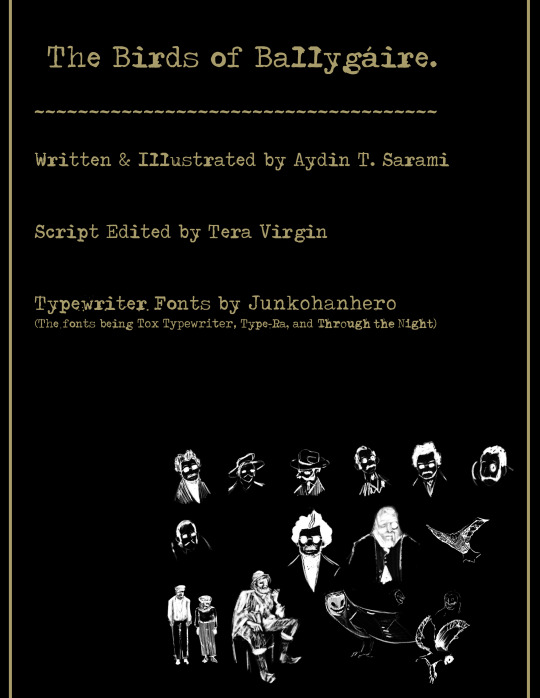
The Birds of Ballygáire.
thank you so much for reading. i appreciate it.
Special thanks to @terastrialbean for script editing & @junkohanhero for their wonderful typewriter fonts.
#oc#ocs#artists on tumblr#art#lovecraftian horror#lovecraft#horror#tyto alba#barn owl#bird#bird art#pendeedles#comic#comics#indie comic#indie comics#horror comic#teeth#irish horror#horror art#vintage#vintage horror#horror comics#indiecomics#dark fantasy#historical horror#historical fiction#illustrationartists#folk horror
853 notes
·
View notes
Text
All my illustrations for David Tennant's magnificent Richard II.
Act One



(No Act Two because 1) it's very short, and 2) he's a complete and utter raging git in it XD)
Act Three



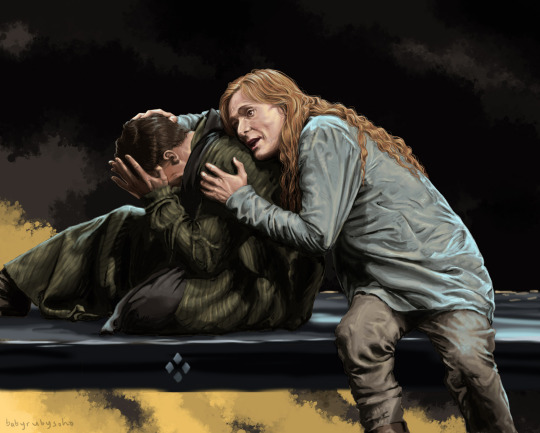


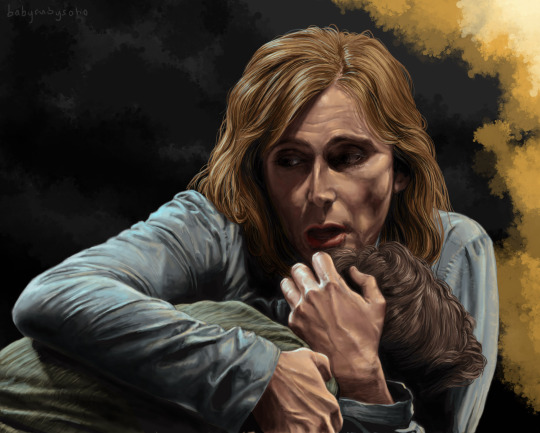
Act Four





Act Five
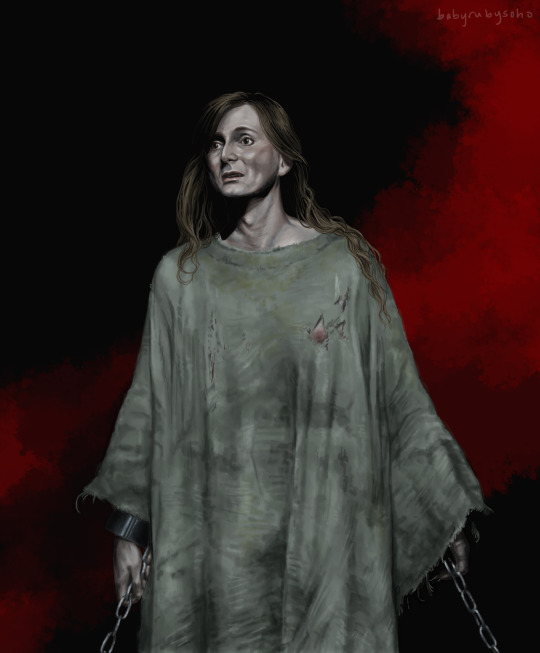

(Thought I'd throw them up all together because right now it's the art I'm proudest of😊)
#david tennant#richard ii of england#richard ii#shakespeare fanart#historical fiction#babyrubysoho art
681 notes
·
View notes
Text
2K notes
·
View notes
Text
"As soon as we die, we enter into fiction. Just ask two different family members to tell you about someone recently gone, and you will see what I mean. Once we can no longer speak for ourselves, we are interpreted."
— Hilary Mantel, from Reith Lectures, Resurrection: The Art and Craft
#hilary mantel#lit#literature#historical fiction#english#english lit#english literature#death#wolf hall
12K notes
·
View notes